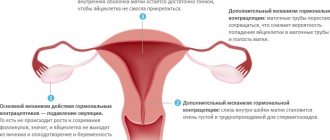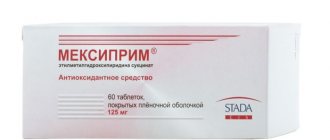A sharp drop in temperature and seasonal weakening of the immune system are often the main causes of acute respiratory viral infections (influenza) and other colds. Any respiratory infection (flu) becomes a real problem with the onset of winter cold, since it is during this period that there is a high degree of epidemiological danger .
An unpleasant sore throat, combined with an uncomfortable runny nose and bouts of dry cough, against the background of a significant increase in body temperature, significantly reduces a person’s quality of life .
The only way to get rid of the discomfort under the current circumstances is to immediately go to the pharmacy . The modern pharmacological industry offers the consumer a wide range of different medications to choose from that promote rapid and effective treatment for any viral infection and colds .
The most common mistake that people make is the active use of various antibiotics , naively believing that they will cope with a cold with lightning speed. However, it is worth remembering that most colds are based on a viral pathogen, on which the antibiotic does not have any harmful effect. The use of antibiotics for diseases of viral etiology is not effective, since in addition to the lack of a positive effect, their use leads to an imbalance in the intestinal microflora .
By destroying bacteria beneficial to the body, it is antibiotics that cause dysbiosis. It is much more justified to use various medicinal antiviral drugs, whose action is aimed at relieving fever , stopping coughing attacks, eliminating a runny nose and eliminating pain symptoms.
The fundamental and basic medicines for the treatment of influenza and colds are antiviral drugs . Their main task is to suppress the activity of the virus. Substances of both natural and artificial origin can be used as active components of such antiviral drugs. Although compared to the countless number of viral pathogens, there are not many antiviral drugs, but those that exist are very good.
The use of antiviral agents favors:
- minimizing the likelihood of exacerbation of chronic diseases of the upper respiratory tract (bronchitis, bronchial asthma);
- reducing the duration of the acute course of a cold;
- reducing the risk of possible complications as a result of a viral infection.
Most doctors, when someone in the family or team at work has a cold, strongly recommend taking antiviral drugs for the purpose of prevention, but in strict accordance with the instructions
Amiksin
The active ingredient of amixin is tilorone. This is a substance that does not interact with viruses in any way and does not kill them, but stimulates the body to an immune response. Activates the production of interferon.
Interferons are structural immune cells in our body. These are protein compounds that are released into the blood in response to the appearance of danger, that is, viruses and bacteria. Thus, the drug amiksin is considered an immunomodulatory agent and is prescribed in complex treatment.
In addition, amixin is suitable not only for the treatment of acute respiratory viral infections and influenza, but is also indicated for:
- all types of viral hepatitis;
- herpetic infection;
- cytomegalovirus;
- allergic and viral encephalomyelitis (multiple sclerosis, leukoencephalitis, uveoencephalitis) as a means for an integrated approach;
- all types of chlamydia;
- complex treatment of pulmonary tuberculosis.
How to take:
The regimen and doses are selected depending on the purpose.
For ARVI, take 1 tablet once a day after meals on days 1, 2 and 4 of treatment. Course - 3 tablets. When complications begin, take 1 tablet, 1 time per day on days 1, 2, 4 and 6. Course - 4 tablets. Contraindications:
pregnancy and lactation, children under 7 years of age, individual reaction to the components of the drug.
Treatment of children
Nature has provided us with the best antiviral agents. These are lemon, garlic, ginger, honey, aloe, rosehip. By regularly supporting your baby’s immunity with such affordable and simple means, the need for medications will disappear by itself.
But if the baby has all the symptoms of the disease, then drug therapy cannot be avoided.
The following antiviral medications for colds are used for children:
- Homeopathic remedies. These medications contain very little active ingredients. How they affect the body is still unclear. But the positive effect is often denied. Doctors recommend using the one-day rule. If the homeopathic medicine does not produce a beneficial effect within 24 hours, there is no need for further use. Such drugs are: “Ocillococcinum”, “Aflubin”, “Anaferon”, “Ergoferon”, “Vibrukol” (suppositories).
- Interferon inducers. These are effective immunostimulants. They force the body to produce interferon on its own. They are prescribed extremely carefully. It is recommended to use these products for a short period of time. Because long-term use depletes resources. As a result, the effectiveness of the drugs is significantly reduced. This group includes medications: “Tsitovir”, “Kagocel”, “Viferon” (suppositories), “Grippferon” (drops). The new generation drug “Derinat” is very effective. It has been noticed that under its influence the body produces its own interferon much faster. Antiviral suppositories (for example, Viferon) deserve special attention. Studies have confirmed that rectal administration can increase the bioavailability of interferon by up to 80%.
- Combination drugs. These are excellent antiviral agents, and at the same time, excellent interferon inducers. These include medications: Cycloferon, Amiksin, Arbidol, Ingavirin, Isoprinosine, Panavir. All products act on viruses and simultaneously stimulate the production of interferon. They are not used for children under two years of age, as the drugs have side effects.
- Anti-flu. This group includes medications: Tamiflu, Remantadine, Relenza. Their effect applies only to influenza viruses. They are ineffective against other diseases.
Ingavirin
The antiviral agent has a double effect: stimulating the production of interferons and another - increasing sensitivity to interferons in cells that are already affected by the virus. However, the drug does not fight the virus itself, as such. So, in the complex treatment of acute respiratory viral infections and influenza, it is prescribed as an auxiliary, immunomodulatory agent. Ingavirin also has a mild anti-inflammatory effect.
Available in capsules of 60 mg for children over 7 years of age and 90 mg for adults. Take 1 capsule per day for 5 – 7 days. Undesirable effects include allergic reactions. Use during pregnancy and lactation is not directly prohibited in the instructions, but it is noted that the safety of its use during these periods has not been studied. Obviously, experimenting on yourself in such a state is not a very smart idea.
Indicated for:
- influenza types A and B
- other types of ARVI (adenoviral infection, parainfluenza, respiratory syncytial infection);
- prevention of influenza A and B and other acute respiratory viral infections;
- How to take: the standard dose is 1 capsule once a day. Full course 6 days. But depending on the type and course of the disease, treatment can be selected individually.
- Contraindications: children under 13 years of age, pregnancy and lactation.
How to use:
The standard dose is 1 capsule 1 time per day.
Full course 6 days. But depending on the type and course of the disease, treatment can be selected individually. Contraindications:
children under 13 years of age, pregnancy and lactation.
Medicine "Oscillococcinum"
Homeopathic medicine, which is available in granules. The product provides effective prevention. It cures colds and flu well. The drug has almost no contraindications. The only exception is lactose intolerance. The product is allowed to be used by newborns from the first days. It is prescribed for lactating and pregnant women.
The medicine is most effective if it is started at the first symptoms of the oncoming disease. The drug "Ocillococcinum" helps suppress the activity of the influenza virus and protects against possible complications.
Tamiflu
The principle of its operation in the body is similar to the previous medicine. In the same way, it affects the production of immune cells, helping to endure the disease much easier and shorten its duration. Patients note that tangible relief after taking Tamiflu occurs already on the 3rd day of use. There are release forms and dosages for both children from 1 year and adults. For children under 8 years of age, the suspension form is recommended.
How to use:
In children it is used twice a day, but the dosage depends on weight. Twice a day: with a weight less than 15 kg - 30 mg, between 15-23 kg - 45 mg, between 23-40 kg - 60 mg. To avoid mistakes with the dosage, a measuring syringe is included in the kit. Children over 8 years old, if they weigh more than 40 kg, can be given 75 mg capsules, otherwise it is better to use a suspension. For adults and children over 12 years of age, the recommended dose is 75 mg 2 times a day. Possible side effects: nausea, vomiting, diarrhea, dizziness, contraindicated in case of renal failure and individual intolerance to the active substance.
Contraindications:
Tamiflu is contraindicated in case of renal failure; use with caution in case of kidney disease and individual intolerance.
Use of drugs for children
It is necessary to remember that an antiviral remedy for colds is a powerful weapon. If used incorrectly, it will not cure ARVI or influenza. And it can even cause harm. Therefore, use the medicine only in the prescribed dosages and according to the specified schedules.
The following list of products will help parents figure out which children's antiviral drugs for colds are suitable for their little ones.
The following medications may be prescribed for newborns:
- "Aflubin" (drops).
- "Interferon".
- "Oscillococcinum".
- "Viferon" (candles).
- "Grippferon".
- "KIPferon".
- "Genferon light" (rectal suppositories).
- "Acyclovir".
Babies who are 1 month old are allowed to use Anaferon for children. It is permissible for six-month-old infants to use the drug Ergoferon.
From 1 year of age, babies can be treated with the following medications:
- "Remantadine."
- "Cytovir 3".
- "Tamiflu."
Two-year-old children can be prescribed Isoprinosine.
For children over 3 years of age, the following medications are suitable:
- "Kagocel".
- "Arbidol".
Four-year-old children are allowed to use the drug "Cycloferon" in tablet form.
Five-year-old babies can already use the following drugs:
- "Relenza."
- "Aflubin" (tablets);
Seven-year-old children can be treated with Amiksin. And from the age of 13, children are allowed to use the drug “Ingavirin”.
Ergoferon
A complex drug for the treatment and prevention of seasonal colds. In addition, it has an anti-inflammatory and antihistamine effect, but is not used as an independent antihistamine.
Ergoferon contains affinity-purified antibodies to human interferon gamma, affinity-purified antibodies to histamine and affinity-purified antibodies to CD4. CD4 cells are white blood cells responsible for the body's immune response to bacterial, fungal and viral infections.
Thus, the action of ergoferon is based on a triple effect on the body and activation of protective functions in three directions. Antibodies to histamine interact with histamine receptors, antibodies to interferon-gamma have an antiviral effect. Antibodies to the CD4 cell receptor enhance the antiviral effect of ergoferon. The triple action provides a complex anti-edematous, anti-inflammatory and antihistamine effect, which distinguishes it from other antiviral drugs.
It has a wide range of indications for prevention and treatment:
- influenza types A and B;
- ARVI,
- adenovirus, parainfluenza virus, respiratory syncytial virus
- herpetic infections
- rotavirus and enterovirus infections
- meningococcal meningitis, hemorrhagic fever with renal syndrome, tick-borne encephalitis;
- acceptable in the complex treatment of pseudotuberculosis, whooping cough, pneumonia of various types and origins
How to use:
Ergoferon is available only in tablets, but is suitable for use in children over 6 months. The tablet should be kept in the mouth without swallowing until completely dissolved. In infants, it is necessary to dissolve the medicine in a tablespoon with water or breast milk. On the 1st day, take 8 tablets: 1 every 30 minutes for 2 hours, then another 1 tablet 2 times a day. Next, ergoferon is taken 1 tablet three times a day until complete recovery.
Contraindications:
individual intolerance
The drug "Anaferon"
This is a homeopathic medicine that can stimulate antiviral immunity. The drug is used to treat influenza. In addition, it is prescribed for preventive purposes. The drug reduces the risk of complications.
The medicine "Anaferon" is allowed to be used by nursing and pregnant women. In addition, when selecting effective antiviral drugs for children with colds, the choice of most parents and doctors stops at this remedy. Manufacturers have released a special form of medicine for babies.
The drug "Anaferon" is contraindicated in individuals who are lactose intolerant. Basically, the remedy does not cause complications. At the same time it is very effective.
Arbidol
In recent years, Arbidol has undergone thorough research and its dubious reputation has been dispelled, and the effectiveness of Arbidol has been proven. Doctors and experts from China and the USA are showing interest in the domestic medicine Arbidol.
Arbidol is also prescribed for the treatment of enteroviruses (the so-called “intestinal flu”, in which, in addition to the main symptoms of ARVI, there is a disorder of the digestive system with vomiting and diarrhea).
The action of arbidol is to block hemagglutinin, a special molecule in the virus shell. It is this molecule that “transports” the virus into the body’s cells through the cell membrane. Arbidol reduces the risk of complications and is indicated, among other things, as a prophylactic during the cold season.
Acceptable for use in children over 2 years of age and adults in powder form for the preparation of a suspension.
How to use:
The drug should be taken 4 times a day: from 2 to 6 years – daily dose of 50 mg (or 10 ml of suspension); from 6 to 12 years – daily dose 100 mg; over 12 years of age and adults - daily dose of 200 mg.
Contraindications:
hypersensitivity, individual intolerance
Operating principle
With the help of antiviral drugs, the causes of the occurrence and development of ARVI are eliminated.
The results of this action are:
- Reducing the risk of exacerbations of chronic diseases (chronic bronchitis, bronchial asthma, etc.).
- Reducing the duration of a cold by several days, alleviating its symptoms.
- Reducing the risk that severe complications will appear after suffering an acute respiratory illness.
In the case of a cold, they are also used as emergency prevention when one of the family members is sick and the risk of infecting others needs to be reduced.
Kagocel
Kagocel does not have a direct effect on viruses, but stimulates the body to an immune response. The drug is suitable for the treatment and prevention of acute respiratory viral infections and viral infections of the upper respiratory tract. Suitable for children from 3 years old. The full course of treatment with Kagocel is 4 days. But the duration of treatment can be adjusted depending on when the patient started treatment and the age of the patient.
How to take: children 3-6 years old take 1 tablet in the morning and evening for the first 2 days, the remaining 2 days take one tablet once; for children over 6 years of age, the daily dose is increased: the first 2 days, 1 three times a day. On days 3 and 4, the drug is taken 2 times a day. The full treatment course is 10 tablets. Adults in the first 2 days - 3 times a day, 2 tablets, then for 2 days, 1 tablet three times a day. The course of treatment is 18 tablets.
Contraindications: pregnancy and breastfeeding, children under 3 years of age, lactase deficiency and lactose intolerance, glucose-galactose malabsorption; hypersensitivity to the components of the product.
Antipyretics
The course of flu and colds is inextricably linked with the presence of a high fever in the patient. To bring down the temperature, inexpensive cold tablets with antipyretic properties are used. The most prominent representative of this group of drugs is inexpensive acetylsalicylic acid (Aspirin). This medicine has been used for quite some time as a remedy for fever. But due to the fact that many patients may experience side effects, it should be taken only as prescribed by a doctor.
Of the modern names, Aspirin-upsa has performed well, which is produced in the form of an effervescent tablet for colds based on two ingredients:
- aspirin;
- vitamin C.
The age limit is children under 4 years old. The tablet dissolves well in water and is quickly and easily absorbed by the body.
Alka-Seltzer, which in addition to Aspirin contains citric acid and soda, has a similar effect and effectiveness against flu and colds.
ARVI: what is it and how to treat it
Acute respiratory viral infection (hereinafter referred to as ARVI) is one of the most common diagnoses that doctors make to their patients if they observe symptoms such as:
- cough;
- headache;
- runny nose and frequent sneezing;
- Pain in the eyes;
- body aches, i.e. unpleasant pain that is felt in the joints and muscles;
- photosensitivity;
- elevated body temperature (not everyone experiences this symptom; a lot depends on the person’s immunity).
It is important to emphasize that ARVI is a disease:
- affecting the respiratory tract;
- caused either by the harmful effects of a virus or infection on the human body.
The question of what to drink or what to take during ARVI is best answered by a doctor. This is especially true for children, whose body, due to its structure, can react ambiguously to treatment that is usual for adults. In addition, some medications are suitable for infants or newborns, and others are suitable for children aged one year and older.
What are they?
Based on the principle of action, these drugs are divided into two groups:
- stimulating the immune system to attack viruses;
- directly attacking viruses.
Also, antiviral agents, widely used for colds and viral diseases in 2020, can be divided into several large groups:
- A group of nucleosides, which includes Acyclovir, Ganciclovir, Vidarabine, Zidovudine, Idoxuridine, Trifluridine, Ribamidili, etc.;
- Interferon and interferon inducers: Interlock, Reaferon, Laferon, Intron A, Betaferon, Neovir, Poludan;
- Adamantane derivatives: Remantadine, Midantan, Arbidol, Oxolin, Riodoxol, Florenal, Bonafton, Adapromin, Metisazone;
- Lipid derivatives, the main representative is Saquinavir;
- Ladolcarbolic acid derivatives: Foscarnet;
- Thiosemicarbazone derivatives: Metisazone;
- Plant origin: Flacoside, Alpidarin, Cholepin, Ligosin, Gossypol.
In addition, there are two large groups based on the principle of action:
- Immunostimulants are drugs that for a short period of time enhance nonspecific immunity and promote the production of interferon.
- Vaccines are special serums that stimulate the secretion of antibodies even before the onset of the disease.
- Antiviral drugs are drugs that affect neuraminidase (a viral enzyme), suppressing the replication of the virus.
It is recommended to start taking antiviral drugs immediately when the first clinical manifestations of a viral infection appear. This will help prevent the virus from multiplying throughout the body.
Tsitovir 3
Complex immunostimulating, antiviral drug, has an interferonogenic effect. The medicine contains Thymogen sodium, ascorbic acid, bendazole.
Positioned as an interferon inducer with an effect similar to Kagocel and Tiloron. It is assumed that bendazole enhances the production of endogenous interferon. Available in the form of capsules, syrup and powder for dissolution. Indications: treatment of influenza and ARVI in the early stages.
There are quite a lot of reviews from patients using Cytovir about the effectiveness and absence of side effects. Improvement in well-being is observed on the second or third day; in isolated cases, the drug did not help. Price: Tsitovir 3 - on average 240-580 rubles.












